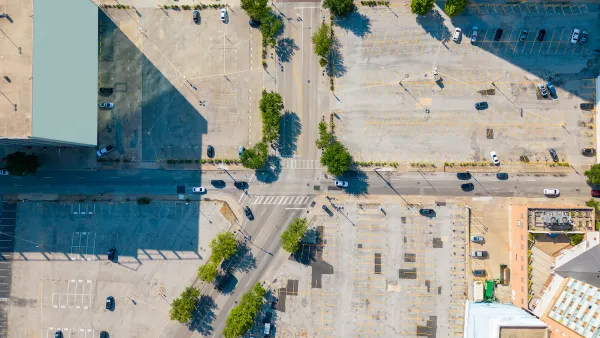Transit Oriented Development projects around the country are still facing suburban-style parking requirements.

Reporting from the Rail-Volution Conference in Dallas, Brandon Formby of The Dallas Morning News looks at how parking requirements for projects around mass transit stations have failed to keep pace with actual needs. Formby cites a study led by University of Utah city planning professor Reid Ewing, which looked at actual parking needs and trip counts for a site in Seattle.
Ewing said the development spurred about 37 percent of the vehicle trips per day that the Institute of Transportation Engineers estimated would occur. He said the guidelines estimated that residential parking demand would require 441 spaces during peak periods. [Ewing] said only 278 spaces would satisfy actual demand.
As has been noted in other studies and articles, the end result of providing more parking than needed is an increase in costs for new housing units in TOD projects. "Those costs are, of course, passed on to renters and buyers — even those without vehicles," said Minneapolis land-use manager Jason Wittenberg.
FULL STORY: Are parking requirements and regulations out of touch with today’s world?

Planetizen Federal Action Tracker
A weekly monitor of how Trump’s orders and actions are impacting planners and planning in America.

Chicago’s Ghost Rails
Just beneath the surface of the modern city lie the remnants of its expansive early 20th-century streetcar system.

Amtrak Cutting Jobs, Funding to High-Speed Rail
The agency plans to cut 10 percent of its workforce and has confirmed it will not fund new high-speed rail projects.

Ohio Forces Data Centers to Prepay for Power
Utilities are calling on states to hold data center operators responsible for new energy demands to prevent leaving consumers on the hook for their bills.

MARTA CEO Steps Down Amid Citizenship Concerns
MARTA’s board announced Thursday that its chief, who is from Canada, is resigning due to questions about his immigration status.

Silicon Valley ‘Bike Superhighway’ Awarded $14M State Grant
A Caltrans grant brings the 10-mile Central Bikeway project connecting Santa Clara and East San Jose closer to fruition.
Urban Design for Planners 1: Software Tools
This six-course series explores essential urban design concepts using open source software and equips planners with the tools they need to participate fully in the urban design process.
Planning for Universal Design
Learn the tools for implementing Universal Design in planning regulations.
Caltrans
City of Fort Worth
Mpact (founded as Rail~Volution)
City of Camden Redevelopment Agency
City of Astoria
City of Portland
City of Laramie





























